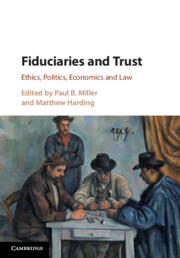Book contents
- Fiduciaries and Trust
- Fiduciaries and Trust
- Copyright page
- Dedication
- Contents
- Contributors
- Acknowledgements
- Introduction
- Part I Personal Trust and Fiduciary Relationships
- Part II Personal Trust and Fiduciary Duties
- Part III Political Trust and Fiduciary Government
- 9 Trust and Authority
- 10 The Fiduciary Crown
- 11 Political (Dis)Trust and Fiduciary Government
- 12 Trust, Distrust and the Rule of Law
- Part IV Trust and Fiduciary Law in Context
- Index
10 - The Fiduciary Crown
The Private Duties of Public Actors in State–Indigenous Relationships
from Part III - Political Trust and Fiduciary Government
Published online by Cambridge University Press: 13 March 2020
- Fiduciaries and Trust
- Fiduciaries and Trust
- Copyright page
- Dedication
- Contents
- Contributors
- Acknowledgements
- Introduction
- Part I Personal Trust and Fiduciary Relationships
- Part II Personal Trust and Fiduciary Duties
- Part III Political Trust and Fiduciary Government
- 9 Trust and Authority
- 10 The Fiduciary Crown
- 11 Political (Dis)Trust and Fiduciary Government
- 12 Trust, Distrust and the Rule of Law
- Part IV Trust and Fiduciary Law in Context
- Index
Summary
This chapter argues that enforceable fiduciary obligations owed by states to Indigenous peoples are best understood as private duties. The private character of state fiduciary duties is unnecessarily obscured by judicial findings that analogise them to private law ones and characterise the relationship as ‘sui generis’. We argue that there is little to be gained by characterising state-Indigenous fiduciary duties, expressly or by implication, as public duties. The private rights and duties generated within state-Indigenous relationships are structurally and substantively distinct from, and sometimes methodologically and normatively opposed to, the more general relationship between state and subjects that underpins public law and liberal political theory. For Indigenous peoples the crucial utility and promise of the state-Indigenous fiduciary relationship depends on the orthodoxy that the state does not, in general, owe fiduciary duties to its subjects. State-Indigenous fiduciary duties can and should function as a corrective to general public and administrative law, one that preserves space for this unique relationship and enables the enforcement of the distinctive rights and duties that attend it. For these reasons we argue that state Indigenous examples should not be used to model an emergent public fiduciary law or fiduciary political theory.
Keywords
- Type
- Chapter
- Information
- Fiduciaries and TrustEthics, Politics, Economics and Law, pp. 198 - 222Publisher: Cambridge University PressPrint publication year: 2020

